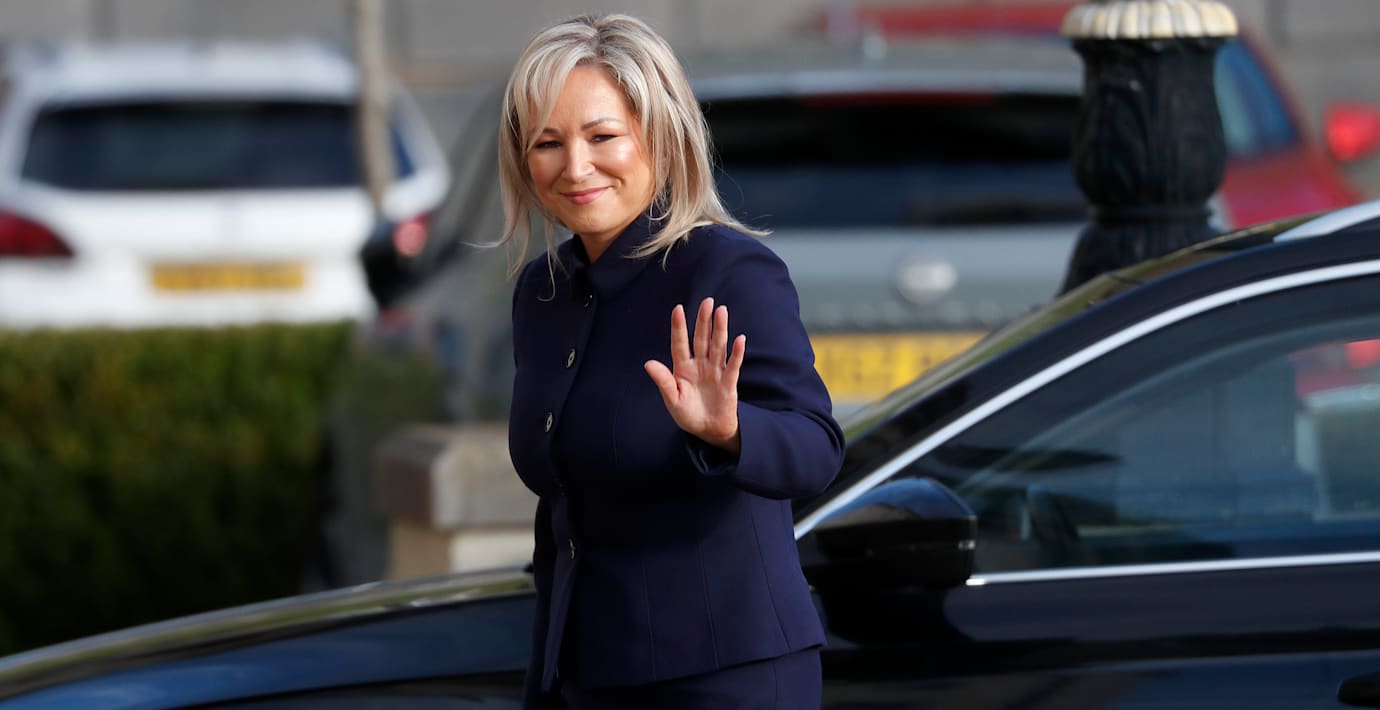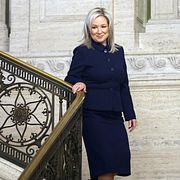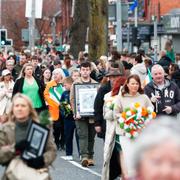
Historisk dag i Nordirland när Sinn Fein tar över
Sinn Feins vice ordförande Michelle O’Neill blev i dag försteminister i Nordirland. Efter mer än två års dödläge i parlamentet röstades O’Neill fram i parlamentet på lördagen. Hon blir därmed den första från nationalistpartiet att leda Nordirland.
Efter valet 2022, där Sinn Fein blev största parti, valde pro-brittiska DUP att bojkotta parlamentsarbetet.
Långfredagsavtalet från 1998, som innebar fred efter årtionden av oroligheter, stipulerar att unionister och republikaner ska samregera och att försteministern och vice försteministern ska ha lika mycket makt. Skillnaden mellan de två posterna är alltså i hög grad symbolisk, skriver AFP.
bakgrund
Sinn Féin
Wikipedia (en)
Sinn Féin ( shin FAYN, Irish: [ˌʃɪn̠ʲ ˈfʲeːnʲ]; English: "[We] Ourselves") is an Irish republican and democratic socialist political party in both the Republic of Ireland and Northern Ireland.
The original Sinn Féin organisation was founded in 1905 by Arthur Griffith. Its members founded the revolutionary Irish Republic and its parliament, the First Dáil, and many of them were active in the Irish War of Independence, during which the party was associated with the Irish Republican Army (1919–1922). The party split before the Irish Civil War and again in its aftermath, giving rise to the two traditionally dominant parties of Irish politics: Fianna Fáil, and Cumann na nGaedheal (which became Fine Gael). For several decades the remaining Sinn Féin organisation was small and often without parliamentary representation. It continued its association with the Irish Republican Army. Another split in 1970 at the start of the Troubles led to the modern Sinn Féin party, with the other faction eventually becoming the Workers' Party.
During the Troubles, Sinn Féin was associated with the Provisional Irish Republican Army. For most of that conflict, there were broadcasting bans on Sinn Féin in the Irish media and in the British media. Although the party sat on local councils, it had a policy of abstentionism for the British House of Commons and the Irish Dáil Éireann, standing for election to those parliaments but pledging not to take their seats if elected. After Gerry Adams became party leader in 1983, electoral politics were prioritised increasingly. In 1986, the party dropped its abstentionist policy for the Dáil; some members formed Republican Sinn Féin in protest. In the 1990s, Sinn Féin—under the leadership of Adams and Martin McGuinness—was involved in the Northern Ireland peace process. This led to the Good Friday Agreement and created the Northern Ireland Assembly, and saw Sinn Féin become part of the power-sharing Northern Ireland Executive. In 2006, it co-signed the St Andrews Agreement and agreed to support the Police Service of Northern Ireland.
Sinn Féin is the largest party in the Northern Ireland Assembly, having won the largest share of first-preference votes and the most seats in the 2022 election, the first time an Irish nationalist party has done so. From 2007 to 2022, it was the second-largest party in the Assembly, after the Democratic Unionist Party (DUP), and its nominees served as deputy First Minister in the Northern Ireland Executive. In the UK House of Commons, Sinn Féin holds seven of Northern Ireland's seats; there, it continues its abstentionist policy. In Dáil Éireann, it is the joint-largest party and is the main opposition, having won the largest share of first-preference votes in the 2020 election. The current party president is Mary Lou McDonald, who succeeded Gerry Adams in 2018.
Omni är politiskt obundna och oberoende. Vi strävar efter att ge fler perspektiv på nyheterna. Har du frågor eller synpunkter kring vår rapportering? Kontakta redaktionen


